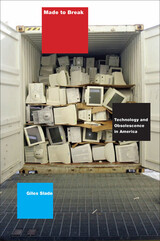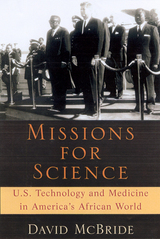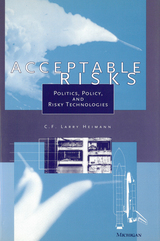Missions for Science: U.S. Technology and Medicine in America's African World
Rutgers University Press, 2002
Cloth: 978-0-8135-3067-3 | eISBN: 978-0-8135-3545-6 (PDF)
Library of Congress Classification T174.3.M38 2002
Dewey Decimal Classification 338.9606
Cloth: 978-0-8135-3067-3 | eISBN: 978-0-8135-3545-6 (PDF)
Library of Congress Classification T174.3.M38 2002
Dewey Decimal Classification 338.9606
ABOUT THIS BOOK | AUTHOR BIOGRAPHY | REVIEWS | TOC
ABOUT THIS BOOK
Missions for Science traces the development and transfer of technology in four Atlantic regions with populations of predominantly African ancestry: the southern United States, the Panama Canal Zone, Haiti, and Liberia. David McBride explores how the pursuit of the scientific ideal, and the technical and medical outgrowths of this pursuit, have shaped African diaspora populations in these areas, asking:
--What specific technologies and medical resources were transferred by U.S. institutions to black populations centers and why?
--How did the professed aims of U.S. technical projects, public health, and military activities differ from their actual effects and consequences?
--Did the U.S. technical transfer amount to a form of political hegemony?
--What lessons can we learn from the history of technology and medicine in these key geographic regions?
Missions for Science is the first book to explain how modern industrial and scientific advances shaped black Atlantic population centers. McBride is the first to provide a historical analysis of how shifting environmental factors and disease-control aid from the United States affected the collective development of these populations. He also discusses how independent black Atlantic republics with close historical links to the United States independently envisioned and attempted to use science and technology to build their nations.
--What specific technologies and medical resources were transferred by U.S. institutions to black populations centers and why?
--How did the professed aims of U.S. technical projects, public health, and military activities differ from their actual effects and consequences?
--Did the U.S. technical transfer amount to a form of political hegemony?
--What lessons can we learn from the history of technology and medicine in these key geographic regions?
Missions for Science is the first book to explain how modern industrial and scientific advances shaped black Atlantic population centers. McBride is the first to provide a historical analysis of how shifting environmental factors and disease-control aid from the United States affected the collective development of these populations. He also discusses how independent black Atlantic republics with close historical links to the United States independently envisioned and attempted to use science and technology to build their nations.
See other books on: Liberia | McBride, David | Medical innovations | Medicine | Technology transfer
See other titles from Rutgers University Press



























